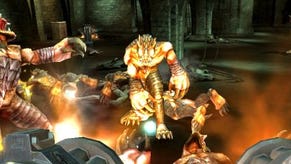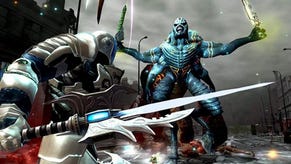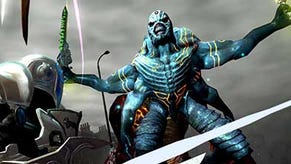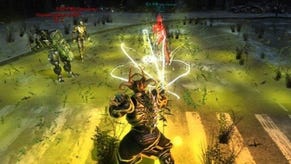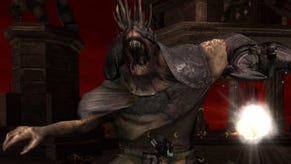Hellgate: Going Underground
Some of you may be hoping I'm going to run out of rubbishy song-title references if we do many more Hellgate stories. Sadly, I could do this all year.
Anyway - let's get on with those Beta impressions I promised you yesterday, eh?
It's just about possible you may not be aware of Hellgate: London, so here's the quick one paragraph version to get you up to speed. Everyone else can skip-skip-away this paragraph. It's the first game from Flagship, who are a group of Blizzard veterans who ran away from the land of World of Warcraft Money to do something new. To be incredibly, unfairly, blunt, it's basically Diablo II in first person. In other words, one of the most addictive games that has ever lurked on a PC's hard-drive, incredible co-op multiplayer, randomised levels (therefore abstractly infinite replayability) and so on. Selecting from six unique classes, you go forth into these areas and generally beat on monsters, take their stuff and either sell it (or break it into its parts) for better stuff or equip it, and then use it to beat on more monsters. For those who have trouble parsing titles, the excuse for all this carnage is that Hell has opened a gate to London. In other words, Diablo II meets Doom in old London town.
Now, I've only played a few hours of it. They're actually a few more hours than I thought I would - I went in for a quick look around, and ended up playing for a good few hours before the game crashed due to my instant messenger program bringing me to desktop. Which was actually lucky, as I was starving and needed to stop and may have starved to death. A choice between mortal sustenance and playing around with the rocket-launcher I'd just found isn't a choice at all.
In other words, it's highly compulsive. My reservations are that I'm not sure that's enough.
Firstly, while there's moments of post-apocalyptic chic to it, it lacks atmosphere. I suspect the problem comes from a couple of places. Number one is that it's only acceptably attractive and - in a few areas - seems even regressive. Monster death animations, for example. When a monster slumps to the floor I've often missed it and carried on shooting the corpse. In the days of ragdolling showing death clearly, this seems really retro. It looks pretty good for an RPG, of course... but the second you make an RPG which moves like an FPS, you're moving into their territory and end up being compared to them. Hellgate comes off badly in such a comparison. The random generation explains some of it, sure... but it doesn't remove the sensation. Number two, it's a role-playing game that's just completely capitulated to massively-multiplayer conventions. While the main arc of the story is a proper narrative, when I hit the first communal area I walked away with a half-dozen quests to go to X bit of the underground and kill Y number of Z monster (Or go to X bit of the underground and get Y objects. Oh yeah - you get Y objects by killing Z monster). Yes, each quest will take you to a randomly generated instance... but it feels completely artificial, as if Flagship just weren't trying to think of ways to hide these time-sink grind mechanisms. I mean, they're instances. Closed areas where abstractly anything could happen. The reason why MMOs use such repetitive limited quests is that, in a shared world, there's a limitation. Using it as the game's backbone is... well, not exactly conductive to a sense of place. It's made worse by the stations themselves being claustrophobically small, with these people offering quests to collect the flotsam and jetsam of the underground being scant metres away from each other.
Secondly, the game's a lot twitchier than games tend to be a month before release. Shacknews did a bit more about this, so read their Beta report. In short, Blizzard games are successful for many reasons, and it's not all pure understanding of gaming mechanisms. It's because they polish like no-one else on the PC. Hellgate, in late Beta, isn't polished enough yet. It's going to be a hard month for Flagship, however you cut it.
Thirdly, while the compulsion to play is acute, the excitement while you're playing isn't. Oh, it has intense moments, but generally speaking, I don't feel threatened by anything Hellgate throws me. I hold down the triggers. I look vaguely in the direction of the monsters attacking me, backing away and firing. They die. I pick up their stuff. It continues. The character development looks as elegantly perfect as Diablo II, and the choices there work great. The deciding on what artifacts to lose, what to upgrade and what to equip are equally nifty. But the actual battles don't feel like battles. The baddies don't feel like baddies. They feel like mobile treasure chests, which I'll open by holding down the fire button and seeing what interesting trinkets are left lying on the floor when they pop. In fact, I find treasure chests harder to deal with than the vast majority of the monsters because they open with a mouse-click rather than the F-key which picks up all the items off the floor and I have to remember to switch.
Now, I've barely started up the level tree - my character's level 7 - and their character customisation has much more to offer. The plot is just kicking off properly. I've done the first couple of Hellgate "things", but there's much more there. How it'll operate co-operatively is of fundamental importance - it's a multiplayer game, after all, and I've been soloing it all.
Still, with all that, it hasn't blown me away. Which is the thing. Hellgate, from what I've seen so far, isn't a bad game by any measure. But this year has been a frankly incredible year for PC games and when compared to its peers, and against all enormous expectations, it's not beyond the realms of possibility that Hellgate may be the season's first genuine disappointment.
Fingers crossed.



